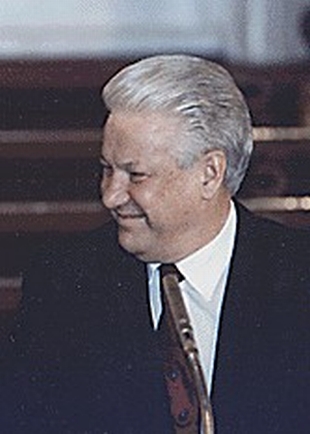
Publisher:
Bonnie King
CONTACT:
Newsroom@Salem-news.com
Advertising:
Adsales@Salem-news.com

~Truth~
~Justice~
~Peace~
TJP
Apr-23-2007 07:01

 TweetFollow @OregonNews
TweetFollow @OregonNews
Former Russian President Boris Yeltsin has Died
Salem-News.comIn August 1991, Yeltsin won international plaudits for casting himself as a democrat and defying the August coup attempt of 1991 by hard-line Communists.
 Boris Nikolayevich Yeltsin |
(MOSCOW) - Boris Nikolayevich Yeltsin, the first President of the Russian Federation from 1991 to 1999 has died today the Kremlin press service is reporting.
He was 76.
The Yeltsin era was a traumatic period in Russian history -- a period marked by widespread corruption, economic collapse, and enormous political and social problems.
In June 1991 Yeltsin came to power on a wave of high expectations. On June 12th Yeltsin was elected president of the Russian Soviet Federated Socialist Republic with 57% of the vote, becoming the first popularly elected president in Russian history.
But he never recovered his popularity after endorsing radical economic reforms in early 1992, which were widely blamed for devastating the living standards of most of the Russian population.
By the time he left office, Yeltsin was a deeply unpopular figure in Russia, with an approval rating as low as two percent by some estimates.
Following the dissolution of Soviet Union in December 1991, Yeltsin -- vowing to transform Russia's socialist planned economy into a capitalist market economy one --endorsed a program of "shock therapy," cutting Soviet-era price controls and introducing drastic cuts in state spending.
The reforms immediately devastated the living standards of much of the population, especially the groups dependent on Soviet-era state subsidies and welfare entitlement programs. By mid decade, Russia had suffered an economic downturn more severe than the United States or Germany had undergone six decades earlier in the Great Depression.
Through the 1990s, Russia's GDP fell 50 percent, vast sectors of the economy were wiped out, income inequality and unemployment grew dramatically, hyperinflation wiped out many families' savings, and tens of millions of Russians were plunged into poverty.
In August 1991, Yeltsin won international plaudits for casting himself as a democrat and defying the August coup attempt of 1991 by hard-line Communists.
Yeltsin either acted as his own prime minister (until June 1992) or appointed men of his choice, regardless of parliament. His confrontations with parliament climaxed in the October 1993 Russian constitutional crisis, when Yeltsin called up tanks to shell the Russian White House, blasting out his opponents in parliament. Later in 1993, Yeltsin imposed a new constitution with strong presidential powers, which was approved by referendum in December.
After the 1998 Russian financial crisis, Yeltsin was at the end of his political career. Just hours before the first day of 2000, Yeltsin made a surprise announcement of his resignation, leaving the presidency in the hands of Vladimir Putin.
Articles for April 22, 2007 | Articles for April 23, 2007 | Articles for April 24, 2007
Salem-News.com:



googlec507860f6901db00.html

Terms of Service | Privacy Policy
All comments and messages are approved by people and self promotional links or unacceptable comments are denied.
HANK RUARK April 24, 2007 2:52 pm (Pacific time)
AL et al: That kind-and-level of arrogant, power-slashing provocation vs democracy is allasame wherever encountered, down the centuries. For even our low-level cogitation the common symptoms command attention by their indubitable mutual presence.
Albert Marnell April 24, 2007 10:28 am (Pacific time)
H.C.R., I could not have said it better myself.
Hank Ruark April 24, 2007 8:10 am (Pacific time)
To all: The parallel is striking when one considers the outcomes. Here's Marion Berger in NY Times (excerpted; see full report in their website.) Note last-pgh summary: "Mr. Yeltsin left a giant, if flawed, legacy. He started to establish a democratic state and then pulled back, lurching from one prime minister to another. "But where Mr. Gorbachev sought to perpetuate the Communist Party, Mr. Yeltsin helped break the party’s hold over the Russian people. "The rapid privatization of industry led to a form of buccaneer capitalism and a new class of oligarchs, who usurped political power as they plundered the country’s resources."
Hank Ruark April 24, 2007 7:43 am (Pacific time)
S. et al: Would NOT matter if you DID..!.next time out would vary as needed to win attention. Noted with dismay is same pattern of potent provisions re common way of life found in past performances here...name of president unneeded for those really paying attention.
S.LaMarche; April 23, 2007 6:23 pm (Pacific time)
oh my God!,I'm crushed! Rosenberg and I may agree on something after all!,and I hope my epitaph makes S-N on that fateful day! Boris, good riddance!
[Return to Top]©2026 Salem-News.com. All opinions expressed in this article are those of the author and do not necessarily reflect those of Salem-News.com.